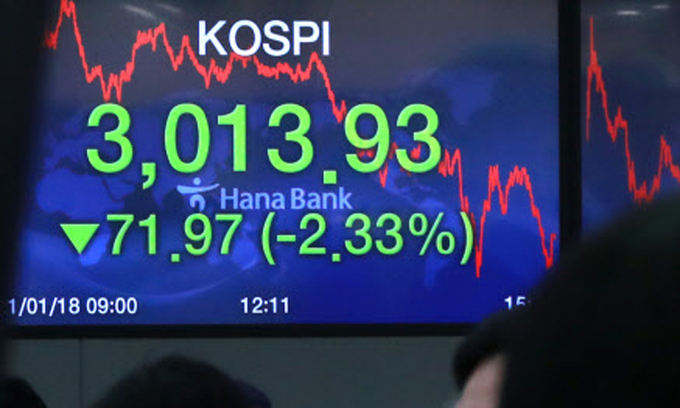
On the afternoon of the 18th, the KOSPI index declined 71.97 points (2.33%) from the previous trading day on the display board at the Myeongdong branch of Hana Bank in Jung-gu, Seoul to 3013.93. News 1
The KOSPI plunged more than 2% and retreated to the 3000 line. With KOSPI being adjusted around 2% for two days in a row, the’debt investment’, where individuals owed their shares to buy stocks, is hitting a record high every day.
According to the Korea Exchange, on the 18th, KOSPI closed at 3013.93, down 71.97 points (2.33%) from the previous trading day. As a result, the KOSPI retreated to the level of the closing price (3031.68) on the 7th when it first broke through the 3000 line.
On this day, the KOSPI started at 3079.90, down 6.00 points (0.19%) from the previous trading day, and then increased the decline.
In particular, the fall of Samsung Group’s shares fell at the same time in the news of Samsung Electronics Vice Chairman Lee Jae-yong’s legal arrest. Samsung Electronics’ stock price plunged 3.41% from the previous day, closing the deal at 85,000 won. In addition, Samsung Electronics Woo (-3.87%), Samsung C&T (-6.84%), Samsung Biologics (-1.99%), and Samsung SDI (-4.21%) also fell sharply.
The Seoul High Court Criminal Division 1 sentenced to two years and six months in prison for Vice-Chairman Lee, who was charged with bribery and other charges. Vice-Chairman Lee, who was being tried in a state of disability, was issued a warrant on that day and was arrested in court.
In the securities market, individuals net bought 5139 billion won, and foreigners net sold 2214 billion won. The institution also sold 272.4 billion won worth of stocks on that day and continued net selling for 7 consecutive trading days. The institution sold 12,164.5 billion won in stock this year alone.
Seo Jeong-hoon, a researcher at Samsung Securities, said, “Since there has been no sense of an increase since the beginning of January, we can judge that the index is still in the overheating range despite the adjustment over the past few days.”
The KOSDAQ closed at 944.67, down 19.77 points (2.05%) from the previous trading day. On the KOSDAQ, individuals and foreigners net bought 11.2 billion won and 12.5 billion won, respectively. The institution continued to sell for 13 consecutive trading days on the KOSDAQ, net selling 8.8 billion won.

Meanwhile, as of the 15th, the credit loan balance of individual investors recorded 21,296.2 billion won, an increase of 13.6 billion won from the previous day. It is an all-time high with an increase of 10 consecutive trading days. Compared to the end of last year (19,221.3 billion won), it has expanded more than 2 trillion won this year alone.
Credit loan balance is the amount that individual investors borrow from securities companies to invest in stocks. Usually, if the stock price is expected to rise, the credit loan balance of individual investors also increases. As new loan balances continue to increase, brokerage firms have also stopped buying credit loans to control excessive credit loan expansion. Daishin Securities announced that it will stop buying credit loans from that day, and NH Investment & Securities will also stop from the 21st. Earlier, Samsung Securities and Eugene Investment & Securities also stopped buying credit loans from the 13th and 15th, respectively.
As the volatility of the KOSPI increased, the volume of counter trading also increased. According to the Financial Investment Association, on the 14th, the volume of counter-trading accounts for unacceptable transactions reached 38.8 billion won, the largest in 12 years since October 27, 2008, at the time of the global financial crisis.
Counter-trading is when the value of the stock (credit transaction) purchased by borrowing money from a securities company falls below a certain level or fails to pay the settlement amount for the stock (accepted transaction) purchased through a foreign transaction, the securities company is forcibly disposing of the bond It is a way to recover.
Reporter Beomsoo Kim [email protected]
[ⓒ 세계일보 & Segye.com, 무단전재 및 재배포 금지]
